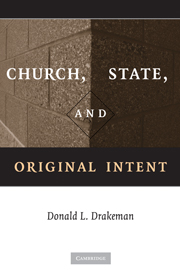Book contents
- Frontmatter
- Contents
- Preface
- 1 Introduction
- 2 Reynolds: The Historical Construction of Constitutional Reality
- 3 Everson: A Case of Premeditated Law Office History
- 4 The Battle for the Historical High Ground
- 5 Original Meanings: Where Is the Historical High Ground?
- 6 Incorporating Originalism
- 7 Conclusion
- Bibliography
- Index
4 - The Battle for the Historical High Ground
Published online by Cambridge University Press: 05 June 2012
- Frontmatter
- Contents
- Preface
- 1 Introduction
- 2 Reynolds: The Historical Construction of Constitutional Reality
- 3 Everson: A Case of Premeditated Law Office History
- 4 The Battle for the Historical High Ground
- 5 Original Meanings: Where Is the Historical High Ground?
- 6 Incorporating Originalism
- 7 Conclusion
- Bibliography
- Index
Summary
McCollum v. Board of Education
The unusual degree of constitutional history appearing in the two major Everson opinions would lead a Court-watcher to predict that the judicial conference in the next establishment clause case would be transfigured into a graduate seminar in American history, with the justices debating the finer points of Madison's Memorial and Jefferson's wall. The chance came just a year later, when the Court heard McCollum v. Board of Education, a 1948 case challenging an Illinois program releasing students from public school classes to attend religious instruction on school property. And, indeed, counsel for the Board of Education played the professorial role, lecturing (and sometimes haranguing) the justices on the proper way to read the relevant history. The school board's brief was based on the pre-publication manuscript of Professor J. M. O'Neill's Religion and Education Under the Constitution, an acerbically nonpreferentialist version of First Amendment originalism. During the three-hour oral argument, the school board's attorney scolded “Justice Black [for having] gone beyond the evidence in his Everson ruling where he stated that government may not ‘aid all religions.’”
One interested observer, Robert Drinan, reported that the justices did not embrace the history lesson warmly: “Justice Black and his associates were clearly not pleased to have their scholarship impugned. In sharp thrusts at counsel during the oral pleadings,…Justice Black and others on the Court made it clear that their version of the First Amendment as proscribing aid ‘to all religions’ was not dicta in Everson and was not being withdrawn.
- Type
- Chapter
- Information
- Church, State, and Original Intent , pp. 149 - 195Publisher: Cambridge University PressPrint publication year: 2009



